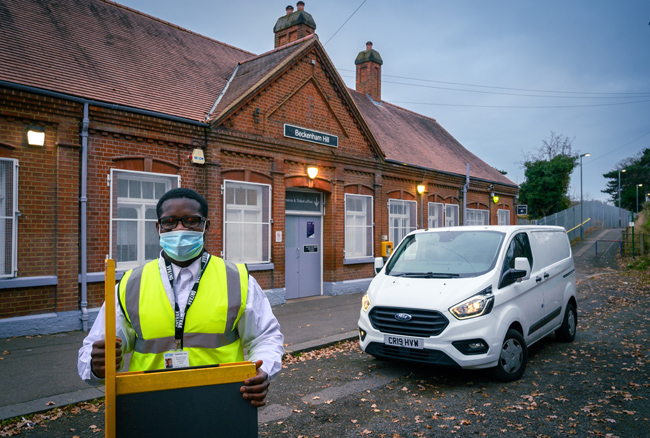The company operating Britain’s biggest rail franchise has denied breaking equalities law, despite a leaked internal document that warns it has been in breach for more than a decade.
The Association of British Commuters (ABC) said it had seen Govia Thameslink Railway’s (GTR) ‘Integrated Communications and Marketing Plan’ for a new Accessible Travel Policy (ATP).

GTR's mobile assistance team at Beckenham Hill station also serves (by road) Crofton Park and Ravensbourne
The campaign group said the document contains two admissions from GTR ‘that it is in breach of equality law due to insufficient staffing levels across its network’.
One of the ATP’s main commitments to improve access for people with disabilities is to provide the services of ‘mobile assistance teams’ at a further 41 locations that do currently offer help with boarding and alighting from trains.
The ABC pointed out that the leaked plan highlights a ‘risk’ in promoting the ATP in that it draws attention to the fact that GTR is currently in breach of its legal requirements under the Equality Act 2010.
The document states: ‘Promotion of the DCO trial is required for the trial to succeed and is a good thing for customers but highlights that GTR is / has been in breach of legal duties since 2010.’
It also points out that ‘by implication’ the 41 stations to benefit from the mobile assistance teams ‘are not currently accessible’, adding ‘we have been in breach of our legal requirements since 2010’.
The ABC pointed out that GTR operates more than 150 stations staff where staff are either not available, or are only available for part of the day, the majority of these stations are served by driver only trains.
It said: ‘Even if GTR fulfils its plans to provide mobile staffing to the 41 stations, this will still leave a substantial number of stations where the assistance necessary to allow disabled people to travel is not available.’
GTR admitted that only 17 stations of the promised 41 now host the mobile assistance teams, in addition to 10 existing stations, adding that it ‘hopes’ to expand this.
A spokesperson explained that the mobile assistance teams are based at a ‘hub’ station and serve a group of stations within a 20-minute radius.
The reference to 20 minutes reflects GTR's request that unbooked customers who require boarding assistance to contact its control centre 20 minutes before their train is due to depart.

Source: Office of Rail and Road
In its response (above) to the 2019 Office of Rail and Road (ORR) consultation that introduced ATPs, Southeastern railway, which was owned by the same parent company as GTR, criticised mobile assistance teams as expensive and unable to adapt or cope with multiple requests at different stations at the same time.
The GTR spokesperson said: ‘This extract taken from an internal working document unfortunately does not represent our position correctly. We do comply with our reasonable adjustment duty under the Equality Act.
‘For example, we offer passengers alternative transport to their nearest accessible station and we have launched mobile assistance teams. We remain firmly committed to making the railway more accessible to all.’
It appears that under its APT, GTR supplies alternative transport in the form of taxis to take passengers both to and from stations that are not physically accessible and to those that are accessible but unstaffed.
The ABC has argued that using taxis as a replacement for staff is not a 'reasonable adjustment' under the Equality Act.
A spokespersom for ORR told Transport Network: 'We engage with GTR on a regular basis to monitor the provision of accessible travel for their passengers.
'We hold them to account against the commitments set out in their Accessible Travel Policy, including their commitment to trial extended use of mobile assistance teams for unstaffed or part-staffed stations that may be serviced by trains where there will be no second member of staff on board.
'The trial is ongoing, and we will continue to monitor GTR’s rollout to further stations, the training they provide for staff, and their approach to assessing the trial’s effectiveness.'
Register now for full access
Register just once to get unrestricted, real-time coverage of the issues and challenges facing UK transport and highways engineers.
Full website content includes the latest news, exclusive commentary from leading industry figures and detailed topical analysis of the highways, transportation, environment and place-shaping sectors.
Use the link below to register your details for full, free access.
Already a registered? Login